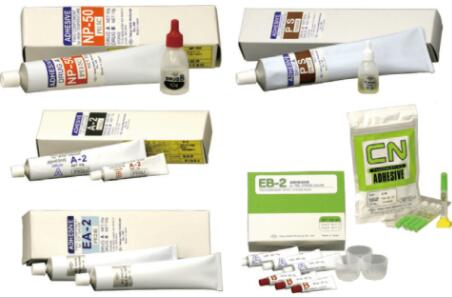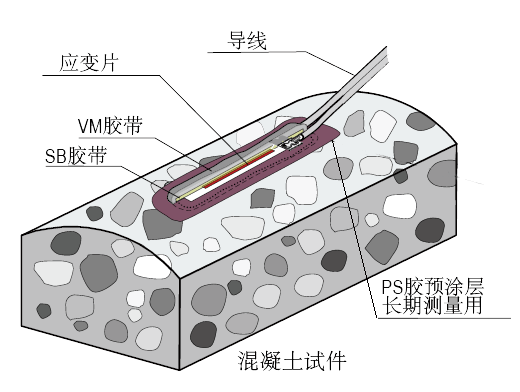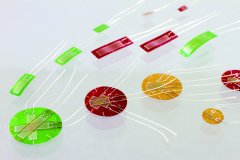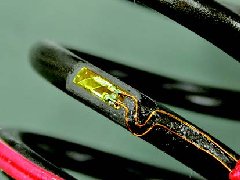CN adhesives(General purpose)
Single-component adhesive for strain gauges.
The time required to bond the gauge is extremely short and handling is very
easy. The thin bonding layer allows adhesion to plastic objects as well as
metal. Curing time under normal conditions is 20~60 seconds
CN-E adhesives(Concrete, Mortar)
Single-component adhesive featuring high
viscosity for bonding strain gauges to porous materials such as concrete and
mortar. Curing time under normal conditions is 40~120 seconds.
CN-R adhesives(Fast hardened type for cold district)
Single-component cement for accelerating cures
in lower ambient temperature, or lower relative humidity. Curing time under
normal conditions is 10~30 seseconds.
CN-Y adhesives(Post-yield)
Single-component adhesive designed exclusively
for use on post-yield strain gauge. Offers minimum degradation in bonding
performance (peel strength) due to aging. Suitable when a large strain
measurement is made after a few days or more of bonding the strain gauge.
Curing time under normal conditions is 60~120 seconds.
P-2 adhesives(General purpose)
Two-component room-temperature-curing polyester
adhesive for bonding PF, P and F series strain gauges. Put the necessary
quantity of drug A in the supplied mixing vessel, then add drug B by drops to
total 2~6% by weight of drug A. Use the mixed adhesive within 5~15 minutes.
RP-2 adhesives(Concrete, Mortar)
Two-component room-temperature-curing polyester
adhesive for bonding PF and P series strain gauges. The mixing procedure is the
same as above for P-2 adhesive. Put the necessary quantity of drug A in the
supplied mixing vessel, then add drug B by drops to total 2~4% by weight of
drug A. Use the mixed adhesive within 10~20 minutes.
PS adhesives(Concrete,Mortar,Wood)
Two-component room-temperature-curing polyester
adhesive. Used as a surface precoating agent for bonding P and PF series gauges
to concrete and also as an adhesive for WFLM series gauges. The special filler
contained exhibits alkali resistance and effectively shuts off moisture and gas
from inside of the concrete. Its high viscosity enables use on vertical walls
or ceilings. Put the necessary quantity of drug A in the supplied mixing
vessel, then add drug B by drops to total 2~4% by weight of drug A.
NP-50B adhesives(High temperature)
Two-component room-temperature-curing polyester
adhesive for bonding QF, ZF and BF series strain gauges. Put the necessary
quantity of drug A into the supplied mixing vessel then add drug B by drops to
total 3~4% by weight of drug A. Use the mixed adhesive within 5~20 minutes.
C-1 adhesives(Long-term measurement, Transducer-specific)
Single-component heat-curing type adhesive. For
use on strain gauges that are suited to heat curing. Enables reliable
measurement for long periods and in high temperature up to 200°C.
EA-2A adhesives(Cryogenic temperature)
Two-component room-temperature-curing epoxy
ahesive for bonding CF series strain gauges for use in temperature from
cryogenic ( - 269 ℃) up to 50 ℃. Mix the necessary quantity of drugs A and B at the weight ratio of
2 to 1.
EB-2 adhesives(Long-term measurement)
Two-component room-temperature-curing epoxy
adhesive for bonding strain gauges for use in temperatures from -60°C to +150°C.
Enables stable measurement for a long period of time. Mix the necessary
quantity of drugs A and B at the weight ratio of 10 to 3.
A-2 adhesives(Bolt embedding)
Two-component heat-curing epoxy adhesive for
bonding BTM strain gauges. Mix the necessary quantity of drugs A and B at the
weight ratio of 10 to 1, then pour the mixed adhesive into a hole drilled of
the bolt in which the gauge is inserted. Keep at room temperature for 12 hours,
then cure at 140°C in furnace for 3 hours.
Download
相關(guān)標簽
TML,Tokyo Measuring Instruments Laboratory

 Enquiry:hkmarketing@epc.com.hk
Enquiry:hkmarketing@epc.com.hk  Whatsapp Enquiry: +85261990717
Whatsapp Enquiry: +85261990717













